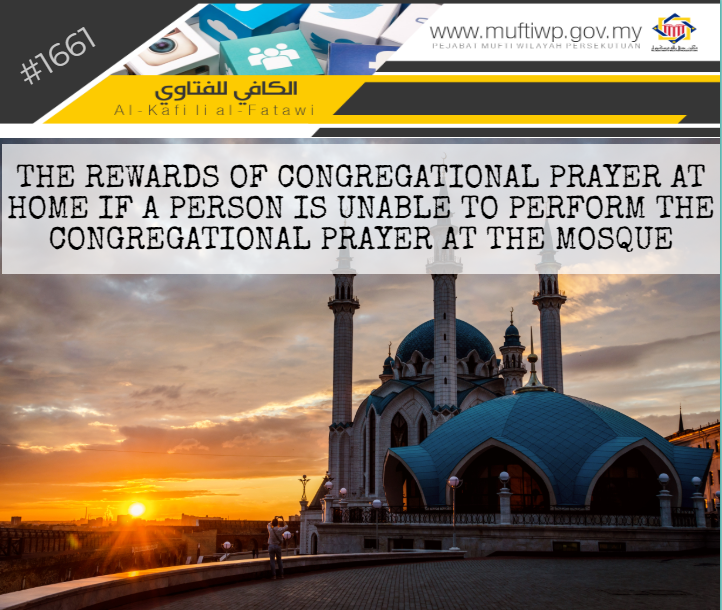Question:
Assalamualaikum ustaz, if the mosques and surau are closed due to the COVID-19 pandemic, are the rewards for the people who always perform the congregational prayer at the mosques or surau decreases if they perform the congregational prayer at home, or do they still receive the same rewards?
Answer:
Waalaikumussalam wrt. wbt.
Alhamdulillah, praise and thanks to Allah for the countless blessings He has blessed us all with. Blessings and salutations to the Prophet Muhammad PBUH, his wives, his family, companions and all those that follow his teachings to the day of judgement.
Attending the mosques for congregational prayer is encouraged in Islam. There are numerous evidences which state the great rewards and encouragement of performing congregational prayer at the mosques. Among them is a hadith narrated by Ibn Abbas R.Anhuma, he said the Prophet PBUH said:
مَنْ سَمِعَ النِّدَاءَ فَلَمْ يَأْتِهِ فَلاَ صَلاَةَ لَهُ إِلاَّ مِنْ عُذْرٍ
"Whoever hears the call and does not come, his prayer is not valid, except for those who have an excuse."
Sunan Ibn Majah (793)
According to the above hadith, a person is asked to attend the congregational prayer if he heard the adhan. However, if he has a certain excuse, then he is exempted from answering the call to attend the congregational prayer. While in another narration, the companions of the Prophet PBUH asked the Prophet PBUH about what are the excuses? Thus, the Prophet PBUH replied:
خَوْفٌ أَوْ مَرَضٌ
“It is fear or illness,”
Sunan Abu Daud (551)
Thus, it is clear that fear or illness are included as the excuse that exempts a person from attending the mosque for the congregational prayer.
Syeikh Mulla ‘Ali al-Qari in his commentary on the hadith said: “Fear for himself, his dignity or property.” He also cited another opinion as to what could lead to the fear: Fear against oppression that happens on himself, rain, extreme cold as well as avoiding impurity. Refer Mirqat al-Mafatih, Mulla ‘Ali al-Qari (3/839).
Coming back to the question presented, we would like to state that if a person always perform the congregational prayer in mosques or surau, then he is unable to perform it because of certain excuses and performs the congregational prayer at home, then he will receive the same rewards as though he performs it when he is able to do so. This opinion is according to the hadith narrated by Abu Musa al-‘Asy’ari, he said the Prophet PBUH said:
إِذَا مَرِضَ الْعَبْدُ أَوْ سَافَرَ، كُتِبَ لَهُ مِثْلُ مَا كَانَ يَعْمَلُ مُقِيمًا صَحِيحًا
“When a slave falls ill or travels, then he will get reward similar to that he gets for good deeds practised at home when in good health.”
Sahih al-Bukhari (2996)
The above hadith shows that is a person is travelling or is sick, then there is a facilitation for him and he will receive the same rewards as if he is residing or healthy. For example, if a person sits to perform prayer because he is sick, then the rewards recorded for him is the same as though he performs his prayer standing. The reason is, if he is not sick, he would surely stand to pray.
Imam Ibn Hajar al-Asqalani in his commentary on the hadith states: “This hadith addresses the rights of those who are obedient but are prevented from doing so (due to some excuses permitted in syarak), while his intention will remain the same, if he is not prevented from it, surely, he would have continued doing so (continue in obedience).” Refer Fath al-Bari, Ibn Hajar (6/136).
Conclusion
To conclude, after we analysed the above evidences and arguments, we state the following:
- If a person who always attend the congregational prayer at the mosque, then he is prevented from doing so because of certain excuses such as fear for himself from being exposed to contagious diseases or if he is experiencing symptoms of the disease, then he will still receive the same rewards as though he attends the congregational prayer at the mosque even if he performs the congregational prayer at home.
- The reason is the feeling of fear خَوْفٌ and illness is included as a permissible excuse to not attend the congregational prayer at the mosque.
- Furthermore, if there is nothing that prevented him from attending the congregational prayer, surely, he would perform the congregational prayer in mosques because it is what he always does. Wallahua’lam.
Lastly, we pray to Allah SWT to be given the correct understanding in religion. Amin.
